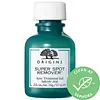What's inside
What's inside
 Key Ingredients
Key Ingredients

 Benefits
Benefits

 Concerns
Concerns

 Ingredients Side-by-side
Ingredients Side-by-side

Alcohol Denat.
AntimicrobialWater
Skin ConditioningPropylene Glycol
HumectantGlycerin
HumectantSodium Stearate
CleansingHamamelis Virginiana Water
AstringentCetyl Alcohol
EmollientMelaleuca Alternifolia Leaf Oil
AntioxidantPhenoxyethanol
PreservativeMethylparaben
PreservativeDisodium EDTA
Limonene
PerfumingTris(Tetramethylhydroxypiperidinol)Citrate
StabilisingLinalool
PerfumingCI 42090
Cosmetic ColorantWater
Skin ConditioningAlcohol Denat.
AntimicrobialAcrylates/C10-30 Alkyl Acrylate Crosspolymer
Emulsion StabilisingSalicylic Acid
MaskingHamamelis Virginiana Water
AstringentEugenia Caryophyllus Bud Oil
MaskingOriganum Heracleoticum Flower Oil
MaskingEugenol
PerfumingLimonene
PerfumingCucumis Sativus Fruit Extract
EmollientPyrus Malus Fruit Extract
Skin ConditioningScutellaria Baicalensis Root Extract
AstringentAlgae Extract
EmollientPoria Cocos Sclerotium Extract
AstringentLaminaria Saccharina Extract
Skin ProtectingLactobacillus Ferment
Skin ConditioningGlycerin
HumectantCaffeine
Skin ConditioningButylene Glycol
HumectantTocopheryl Acetate
AntioxidantMagnesium Ascorbyl Phosphate
AntioxidantSodium Hydroxide
BufferingPhenoxyethanol
PreservativeAquilaria Agallocha Wood Oil
MaskingWater, Alcohol Denat., Acrylates/C10-30 Alkyl Acrylate Crosspolymer, Salicylic Acid, Hamamelis Virginiana Water, Eugenia Caryophyllus Bud Oil, Origanum Heracleoticum Flower Oil, Eugenol, Limonene, Cucumis Sativus Fruit Extract, Pyrus Malus Fruit Extract, Scutellaria Baicalensis Root Extract, Algae Extract, Poria Cocos Sclerotium Extract, Laminaria Saccharina Extract, Lactobacillus Ferment, Glycerin, Caffeine, Butylene Glycol, Tocopheryl Acetate, Magnesium Ascorbyl Phosphate, Sodium Hydroxide, Phenoxyethanol, Aquilaria Agallocha Wood Oil
 Reviews
Reviews

Ingredients Explained
These ingredients are found in both products.
Ingredients higher up in an ingredient list are typically present in a larger amount.
Alcohol Denat. is an alcohol with a denaturant property. It is created by mixing ethanol with other additives.
This ingredient gets a bad rep because it is irritating and drying - mostly due to its astringent property. Astringents draw out natural oils in tissue, constricting pores and leaving your skin dried out.
However, alcohol denat. is not all that bad.
Due to its low molecular weight, alcohol denat. tends to evaporate quickly. One study on pig skin found half of applied alcohol evaporated in 10 seconds and less than 3% stayed on skin.
This also helps other ingredients become better absorbed upon application.
Studies are conflicted about whether this ingredient causes skin dehydration. One study from 2005 found adding emollients to propanol-based sanitizer decreased skin dryness and irritation. Another study found irritation only occurs if your skin is already damaged.
Small amounts of alcohol are generally tolerated by oily skin or people who live in humid environments.
The rule of thumb is if this alcohol is near the end of an ingredients list, it will probably not affect your skin much.
Also...
This ingredient has antimicrobial and solvent properties.
The antimicrobial property helps preserve products and increase their shelf life. As a solvent, it helps dissolve other ingredients.
Other types of astringent alcohols include:
Learn more about Alcohol Denat.Glycerin is already naturally found in your skin. It helps moisturize and protect your skin.
A study from 2016 found glycerin to be more effective as a humectant than AHAs and hyaluronic acid.
As a humectant, it helps the skin stay hydrated by pulling moisture to your skin. The low molecular weight of glycerin allows it to pull moisture into the deeper layers of your skin.
Hydrated skin improves your skin barrier; Your skin barrier helps protect against irritants and bacteria.
Glycerin has also been found to have antimicrobial and antiviral properties. Due to these properties, glycerin is often used in wound and burn treatments.
In cosmetics, glycerin is usually derived from plants such as soybean or palm. However, it can also be sourced from animals, such as tallow or animal fat.
This ingredient is organic, colorless, odorless, and non-toxic.
Glycerin is the name for this ingredient in American English. British English uses Glycerol/Glycerine.
Learn more about GlycerinHamamelis Virginiana Water is made by distilling parts of the witch hazel plant. You can also call this ingredient "witch hazel water".
The name 'Hamamelis Virginiana Water' refers to the distillation product used in cosmetics. On the other hand, 'Witch Hazel' refers to the active drug ingredient.
Unless it is specified to be non-alcohol, many types of witch hazel ingredients are distilled in denatured alcohol.
Witch Hazel water is an astringent, anti-inflammatory antioxidant, and antibacterial ingredient.
It contains tannins. Tannins have a drying effect when used on skin by constricting proteins. The constriction also minimizes the appearance of pores.
Both the tannins and fragrance found in witch hazel may be skin-sensitizing.
Witch hazel water gets anti-inflammatory and antibacterial properties from its catechin and gallic acid content.
Indigenous groups have used witch hazel to help treat inflammation in North America for centuries.
Learn more about Hamamelis Virginiana WaterLimonene is a fragrance that adds scent and taste to a formulation.
It's found in the peel oil of citrus fruits and other plants such as lavender and eucalyptus. The scent of limonene is generally described as "sweet citrus".
Limonene acts as an antioxidant, meaning it helps neutralize free radicals.
When exposed to air, oxidized limonene may sensitize the skin. Because of this, limonene is often avoided by people with sensitive skin.
The term 'fragrance' is not regulated in many countries. In many cases, it is up to the brand to define this term. For instance, many brands choose to label themselves as "fragrance-free" because they are not using synthetic fragrances. However, their products may still contain ingredients such as essential oils that are considered a fragrance.
Learn more about LimonenePhenoxyethanol is a preservative that has germicide, antimicrobial, and aromatic properties. Studies show that phenoxyethanol can prevent microbial growth. By itself, it has a scent that is similar to that of a rose.
It's often used in formulations along with Caprylyl Glycol to preserve the shelf life of products.
Water. It's the most common cosmetic ingredient of all. You'll usually see it at the top of ingredient lists, meaning that it makes up the largest part of the product.
So why is it so popular? Water most often acts as a solvent - this means that it helps dissolve other ingredients into the formulation.
You'll also recognize water as that liquid we all need to stay alive. If you see this, drink a glass of water. Stay hydrated!
Learn more about Water